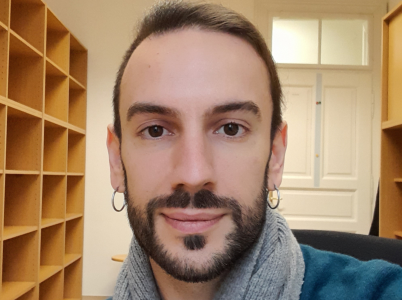Guest Scholars
Xavier Hernàndez i Garcia
March - June 2023
Xavier Hernàndez i Garcia is a pre-doctoral researcher at the University of València where he is preparing his PhD thesis Joan Fuster and the music: aesthetic ideas, metatextuality and intermedial relations under the supervision of Dr. Carme Gregori. In 2018 he completed his degree in Catalan Language and Literature and studied a Master's Degree in Music as an Interdisciplinary Art at the University of Barcelona, the University Rovira i Virgili of Tarragona, and the Escola Superior de Música de Catalunya (ESMUC), where he had the opportunity to start investigating the relations between music and other arts and to publish his first articles on the matter.
In 2021 he started his PhD with a talent attraction grant for young researchers from the University of València which allowed him to work with the Group of Contemporary Catalan Literature (GLCC), that is currently studying hypertextuality and intermediality in Catalan contemporary writers. In that sense, he has already published articles about the music in the cinematographic realism of Eric Rohmer, the influence of Bach and Mozart in the aesthetics of the Catalan writers Joan Maragall i Eugeni d'Ors, Catalan poetry and jazz, and intermediality in the theatrical work Maremar.

Xavier Hernàndez i Garcia's main project is about Joan Fuster, one of the most prolific and important writers of the Catalan culture. Xavier has already given conferences and published articles about the author's relation with music. One of them "Contra l'òpera" (Against opera) was awarded with the 2022 Cathedra Joan Fuster prize for young researchers. In Graz, he examined the musical poems of the author from an intermedial perspective. In that sense, he has just published the chapter "The musicalitzation of poetry in Joan Fuster. An intermedial study of the poems "Bach" and "Chopin"" in the last book of the Catalan Society of Language and Literature.

Stefano Franceschini
January - February 2023
Stefano Franceschini is a PhD student at Roma Tre University. The Italian Association for North American Studies (AISNA) awarded him the 2021 edition of the Caterina Gullì prize for his MA dissertation on H. P. Lovecraft's cosmicist tales, A New Supernatural Literature: Cosmic Art and Parascience in H. P. Lovecraft's Fiction. He is currently member of AISNA and of the scientific committee of the Center for American Studies in Rome. He has published articles and reviews on H.P. Lovecraft, Ambrose Bierce, and Richard Powers. His research interests include intermediality, Gothic and weird fiction, semiotics, and philosophy of music.
Stefano's doctoral project-"What Does That Tune Mean?": Phonosemiosis and Heteromediality in Richard Powers's Novels-seeksto examine the interconnection between meaning, music, and sound in the works of Richard Powers, with a focus on the musicality of the novels The Gold Bug Variations (1991), The Time of Our Singing (2003) and Orfeo (2014). These texts can be read as instances of the multiple ways in which the author expresses in literary form the belief that music operates as a system whose units, structures and functions stand for something other than their acoustic signifiers. However, Powers's acute sensitivity to sound is not limited to musical semiosis in the strict sense; even in those novels where aural phenomena are only marginally thematized-including The Echo Maker (2006) and the more recent The Overstory (2018) and Bewilderment (2021)-the author hears and registers a pervasive sonic network that inevitably presents itself as meaningful.
In Graz, he was specifically working on Richard Powers's novel Orfeo. His analysis of the book took off from its most significant refrain, which repeatedly occurs through the perspective of Peter Els, the story's protagonist: "Music doesn't mean things... it is things." Conceptually drawing on philosophy of music, he wanted to use the character's musical motto as the starting point for his interpretation of the novel, which was rooted in the comparison between two distant views in regards to musical meaning-making: formalism and expressionism. Given the relevance that the connection between music and meaning takes on in the novel, his ultimate goal was to contribute to stimulate readers and listeners alike to think of and experience music more critically, especially in view of the ubiquitous presence of noise, sounds and music in today's hypermedial Western society.